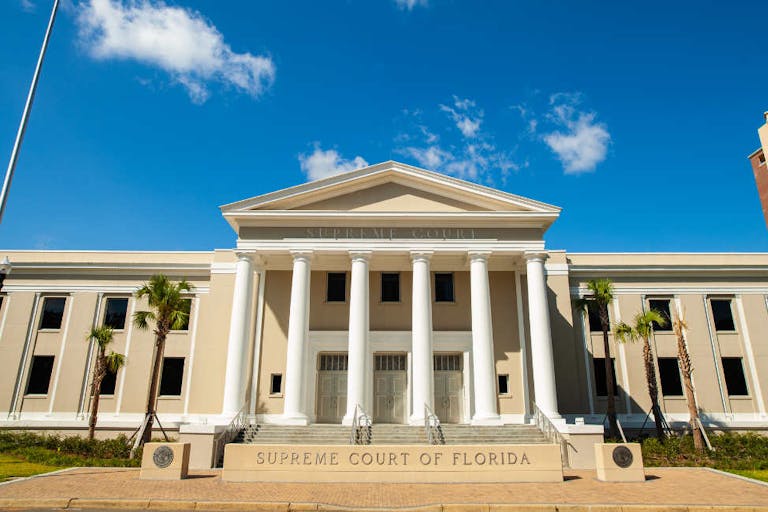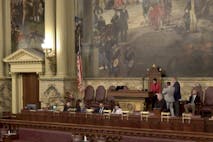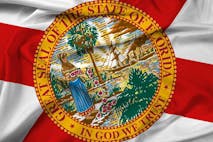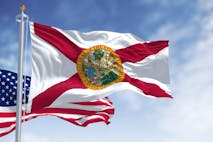
Thousands of South Korea schools close as birth rate plummets
Cassy Cooke
·
Guest Column·By Liberty Counsel
Oral arguments begin at Florida Supreme Court on abortion amendment
(Liberty Counsel) Today, the Florida Supreme Court heard oral arguments on whether a proposed amendment should be put on Florida’s November 2024 ballot that would offer voters the chance to codify unrestricted abortion as a right in the state constitution.
The proposed amendment, “Amendment to Limit Government Interference with Abortion,” would create a new section in the Florida Constitution “limiting government interference with abortion.” The full text of the accompanying ballot summary states: “No law shall prohibit, penalize, delay, or restrict abortion before viability or when necessary to protect the patient’s health, as determined by the patient’s healthcare provider. This amendment does not change the Legislature’s constitutional authority to require notification to a parent or guardian before a minor has an abortion.”
Liberty Counsel Founder and Chairman Mat Staver and Florida Senior Deputy Solicitor for the Attorney General Nathan Forrester argued before the court’s seven justices asking them to reject the amendment because its language violates voter requirements by being “broad, misleading, and deceptive.” In addition, the broad and undefined amendment language also violates the single subject rule.
During the near hour-long session, Staver and Forrester made several key points on why the proposed amendment should be rejected. Staver stated it violates the Florida Constitution’s single-subject requirement and would “substantially alter the government.” He stressed that the “No law shall restrict” language would completely deregulate abortion and disempower the three branches of government from any discretionary power to protect Florida citizens regarding abortion. Currently, the legislative branch is authorized to “prohibit” abortion through legislation; the executive branch is authorized to “penalize” citizens who violate abortion laws; and the judicial branch is authorized to “delay” or “restrict” any illegal or unconstitutional conduct. Lumping functional alterations to each branch of government in one amendment also violates the single-subject requirement.
“In this case, the breadth of those four words, ‘prohibit, penalize, delay, and restrict’ with regards to abortion disables all three forms of government… and it is a total abolition of the functions of those branches of government.”
In addition, the argument to strike down the amendment included the idea that it is misleading and deceptive due to not defining key terms for the voter such as “health,” “viability,” “necessary,” and “health care provider.” These vague and undefined terms could then authorize a wide range of professions with no medical training to determine if a baby is viable, and whether an abortion is “necessary” for the patient’s “health” at all stages of pregnancy up to birth.

Attorney Courtney Brewer, who argued on behalf of the amendment’s sponsor, Floridians Protecting Freedom, stated the language of the amendment is clear and the “voters are perfectly capable of understanding” what the terms mean and should be able to “exercise their voice” and vote on it in November.
The justices fired questions at both sides of the argument and homed in on the “broad” and “sweeping” language of the amendment and whether the voter would understand the amendment’s effects.
Both Justice Meredith Sasso and Justice Jamie Grosshans stated the amendment would “change the status quo” and could have “multiple interpretations” which could “surprise a lot of voters.”
Justice Sasso stated, “There’s two scenarios. Either the words are undefined, and it will be played out later down the line in which case the voters are not advised of them, or this has a very clear meaning and the voters are not advised of the fact that it is going to shift policymaking from the legislature to this expert class of doctors to determine when to end lives in Florida.”
Article continues below
Dear Reader,
In 2026, Live Action is heading straight where the battle is fiercest: college campuses.
We have a bold initiative to establish 100 Live Action campus chapters within the next year, and your partnership will make it a success!
Your support today will help train and equip young leaders, bring Live Action’s educational content into academic environments, host on-campus events and debates, and empower students to challenge the pro-abortion status quo with truth and compassion.
Invest in pro-life grassroots outreach and cultural formation with your QUADRUPLED year-end gift!
Justice Renatha Francis then stated, “… the chief purpose that is not communicated by the amendment proposed is that we would be enshrining abortion without restriction for the entire nine months of pregnancy. That is not being communicated in the language as it is drafted now…and it has divided everyone according to their personal beliefs.”
Justice John Couriel stated that the amendment may even allow a tattoo artist to make decisions about abortion.
Staver replied, “On the face of it, [the amendment] says ‘No law shall restrict.’ Every law and regulation restrict something. Under this amendment, the legislature would not be able to remedy or regulate bad actors.”
While Chief Justice Carlos Muñiz stated the amendment is “self-evidently broad,” he questioned whether the Florida Constitution includes the unborn in its definition of “natural person” and if the Court needed to decide that to determine whether the amendment goes forward or not.
“[The amendment] kind of assumes that the Constitution as it exists right now is silent as to the rights of the unborn. And I don’t know if that assumption is correct…if you view it as the rights of the woman and the rights potentially of the unborn that kind of changes the equation…,” stated Justice Muñiz.
The Florida Supreme Court is expected to render a decision by April 1. If the Court rejects the amendment, it will not appear on Florida’s 2024 ballot.
Staver concluded, “The amendment should not be approved because the language is deceptive and misleading. The amendment would authorize abortion for any reason at any time up to birth. The amendment’s sponsors want to fool the voters into changing the Florida Constitution to completely deregulate abortion, including doing away with health and safety standards, parental and informed consent. No law or regulation would stand if this amendment is passed. The amendment will literally throw women into back-alley abortion. The state will not be able to protect women.”
Editor’s Note: This press release was originally published at Liberty Counsel.
Live Action News is pro-life news and commentary from a pro-life perspective.
Contact editor@liveaction.org for questions, corrections, or if you are seeking permission to reprint any Live Action News content.
Guest Articles: To submit a guest article to Live Action News, email editor@liveaction.org with an attached Word document of 800-1000 words. Please also attach any photos relevant to your submission if applicable. If your submission is accepted for publication, you will be notified within three weeks. Guest articles are not compensated (see our Open License Agreement). Thank you for your interest in Live Action News!

Cassy Cooke
·
Issues
Wesley J. Smith
·
Issues
Michael J. New
·
Issues
Right to Life UK
·
Politics
Tabitha Goodling
·
Human Interest
Andrea Trudden
·
Guest Column
Liberty Counsel
·
Guest Column
Liberty Counsel
·
Guest Column
Liberty Counsel
·
Guest Column
Liberty Counsel
·
Guest Column
Liberty Counsel
·